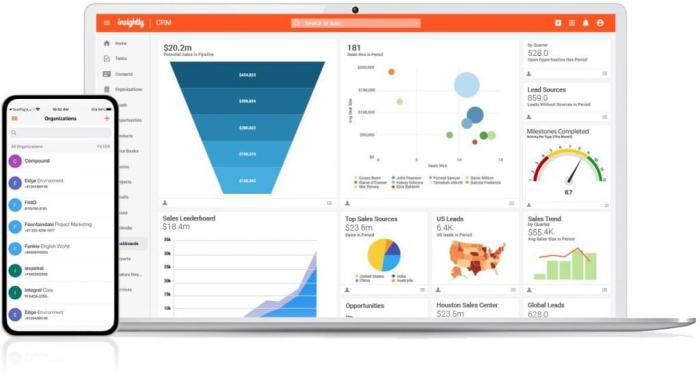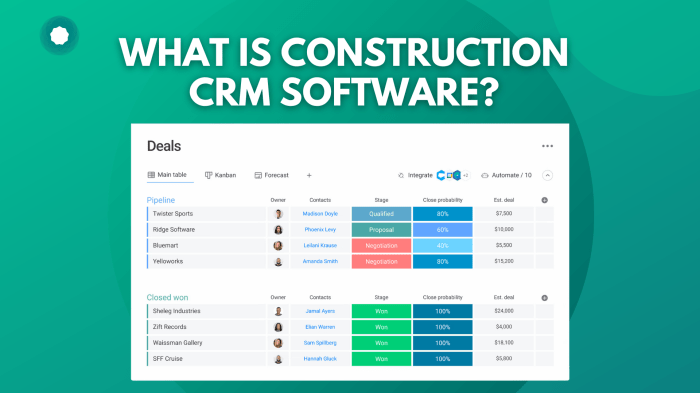Crm software for construction companies – The construction industry is known for its complexity. Juggling multiple projects, managing diverse teams, and tracking intricate details requires meticulous organization and efficient communication. Enter Customer Relationship Management (CRM) software – a powerful tool that can significantly improve operational efficiency and profitability for construction companies of all sizes. This comprehensive guide explores the benefits, features, and considerations of implementing a CRM specifically tailored for the construction industry.
Why Construction Companies Need CRM Software
Construction projects are inherently multifaceted. From initial client interaction to final project handover, numerous touchpoints demand seamless coordination. Without a robust system, crucial information can get lost, deadlines can be missed, and relationships can suffer. A well-implemented CRM system addresses these challenges by:

Source: technologyadvice.com
- Centralizing Client Information: Store all client details, project history, communication logs, and contract information in one easily accessible location. This eliminates the risk of data silos and ensures everyone has access to the most up-to-date information.
- Improving Project Management: Track project milestones, deadlines, budgets, and resource allocation effectively. Real-time dashboards provide a clear overview of project progress, allowing for proactive issue resolution.
- Enhancing Communication and Collaboration: Facilitate seamless communication between project managers, subcontractors, clients, and internal teams. Integrated communication tools streamline workflows and minimize delays.
- Boosting Sales and Lead Management: Efficiently manage leads, track sales opportunities, and nurture relationships with potential clients. Automated lead nurturing campaigns can significantly improve conversion rates.
- Streamlining Reporting and Analytics: Generate comprehensive reports on project performance, financial data, and client satisfaction. Data-driven insights help optimize processes and improve decision-making.
- Improving Customer Satisfaction: By providing exceptional service and timely communication, a CRM helps foster strong client relationships, leading to repeat business and positive referrals.
Key Features of a Construction-Specific CRM
While many general CRM solutions exist, construction-specific software offers features tailored to the unique needs of the industry. These features often include:
Project Management Capabilities:
- Task Management: Assign tasks, set deadlines, and track progress on individual tasks within projects.
- Resource Allocation: Manage equipment, personnel, and materials effectively, ensuring optimal resource utilization.
- Budget Tracking: Monitor project costs against budgets, identifying potential overruns early on.
- Document Management: Store and manage all project-related documents, such as contracts, blueprints, and permits, in a centralized repository.
- Progress Reporting: Generate automated progress reports for clients and internal stakeholders.
Client Relationship Management Features:, Crm software for construction companies
- Contact Management: Maintain detailed records of client contacts, including communication history and preferences.
- Lead Management: Track leads from initial contact to project completion, improving sales conversion rates.
- Communication Tools: Integrate email, phone, and messaging functionalities for seamless communication.
- Customer Service Ticketing: Efficiently manage client inquiries and resolve issues promptly.
Integration and Reporting:
- Accounting Software Integration: Seamlessly integrate with accounting software for accurate financial tracking.
- GPS Tracking Integration: Track equipment and personnel location in real-time for improved efficiency.
- Customizable Reporting: Generate tailored reports to monitor key performance indicators (KPIs).
Choosing the Right CRM for Your Construction Business
Selecting the right CRM involves careful consideration of several factors:
- Size and Complexity of Your Business: A small construction company might require a simpler solution than a large enterprise.
- Budget: CRM solutions range in price, from affordable cloud-based options to more expensive enterprise-level systems.
- Specific Needs: Identify the key features and functionalities that are most crucial for your business operations.
- Integration Capabilities: Ensure the CRM integrates seamlessly with your existing software systems.
- User-Friendliness: Choose a CRM with an intuitive interface that is easy for your team to learn and use.
- Scalability: Select a CRM that can grow with your business as it expands.
Top CRM Software Options for Construction Companies
(Note: This section would list specific CRM software options with brief descriptions and links to their websites. Due to the constantly evolving nature of software and potential for bias, specific product recommendations are omitted here. A quick online search for “Construction CRM software” will provide many current options.)
Implementing a CRM: A Step-by-Step Guide: Crm Software For Construction Companies
- Assess Your Needs: Identify your business’s specific requirements and challenges.
- Research and Select a CRM: Compare different options based on features, cost, and scalability.
- Data Migration: Transfer existing client and project data to the new CRM system.
- Training and Onboarding: Provide comprehensive training to your team on how to use the new CRM.
- Customization and Configuration: Tailor the CRM to your specific workflows and processes.
- Ongoing Monitoring and Optimization: Regularly monitor the system’s performance and make adjustments as needed.
Frequently Asked Questions (FAQ)
- Q: How much does CRM software for construction companies cost? A: The cost varies significantly depending on the features, scalability, and vendor. Expect to pay anywhere from a few hundred dollars per month to several thousand dollars per year for enterprise-level solutions.
- Q: How long does it take to implement a CRM? A: Implementation time depends on the complexity of the system and the size of your company. It can range from a few weeks to several months.
- Q: What are the key benefits of using a construction-specific CRM? A: Construction-specific CRMs offer features tailored to the industry’s unique needs, such as project management tools, resource allocation features, and integration with specialized software.
- Q: Can a CRM improve client satisfaction? A: Yes, by improving communication, providing timely updates, and offering excellent customer service, a CRM can significantly enhance client satisfaction.
- Q: Is cloud-based CRM better than on-premise CRM? A: Cloud-based CRMs offer greater flexibility, accessibility, and cost-effectiveness, but on-premise solutions may offer more control and customization options.
Conclusion
Implementing a CRM system is a strategic investment that can significantly improve the efficiency, profitability, and overall success of your construction company. By centralizing information, streamlining workflows, and enhancing communication, a well-chosen CRM can transform your business operations. Take the time to research your options, assess your needs, and choose a solution that aligns with your goals. The benefits far outweigh the initial investment.

Source: cjpath.com
Call to Action
Ready to streamline your construction business and unlock its full potential? Contact us today for a free consultation and let us help you find the perfect CRM solution for your needs.
FAQs
What are the common features of CRM software for construction companies?
Common features include contact management, lead tracking, project management tools, document storage, reporting and analytics, and potentially integration with accounting software.
How much does CRM software for construction companies cost?
Pricing varies greatly depending on the features, number of users, and vendor. Expect to find options ranging from affordable monthly subscriptions to more expensive enterprise-level solutions.
How long does it take to implement a CRM system?
Implementation time depends on the complexity of the system and the size of the company. It can range from a few weeks to several months.
What are the key benefits of using CRM software in construction?
Key benefits include improved client communication, better project management, enhanced team collaboration, increased efficiency, and improved profitability.
Can CRM software integrate with other software used in construction?
Many CRM systems offer integration capabilities with other software such as accounting, project management, and estimating tools. It’s crucial to check for compatibility before selecting a system.
